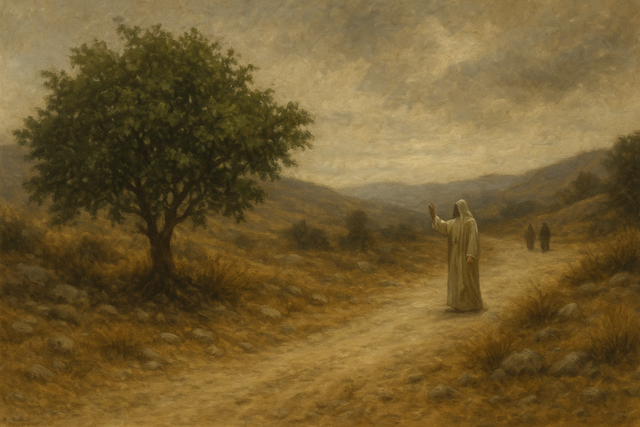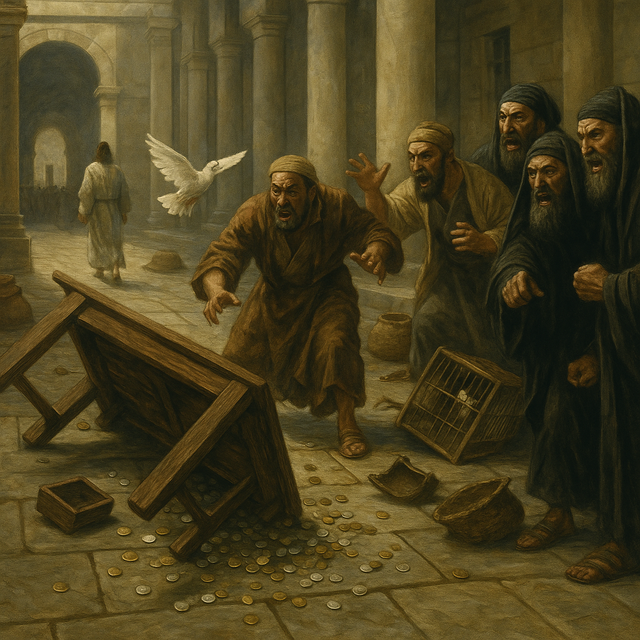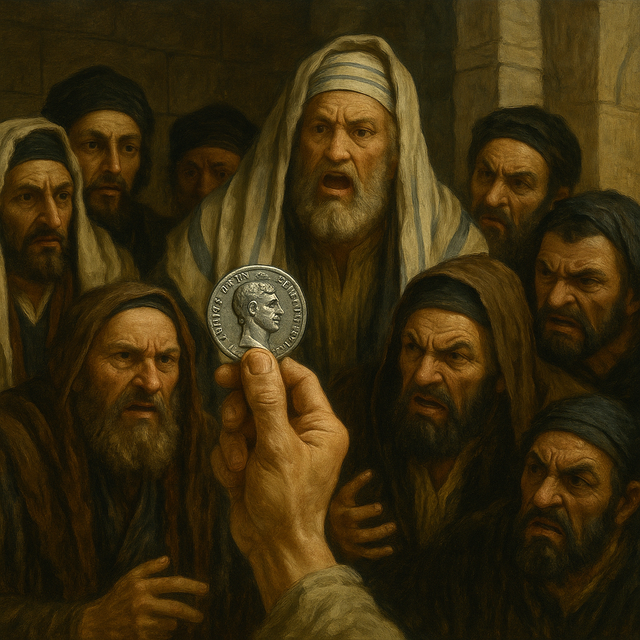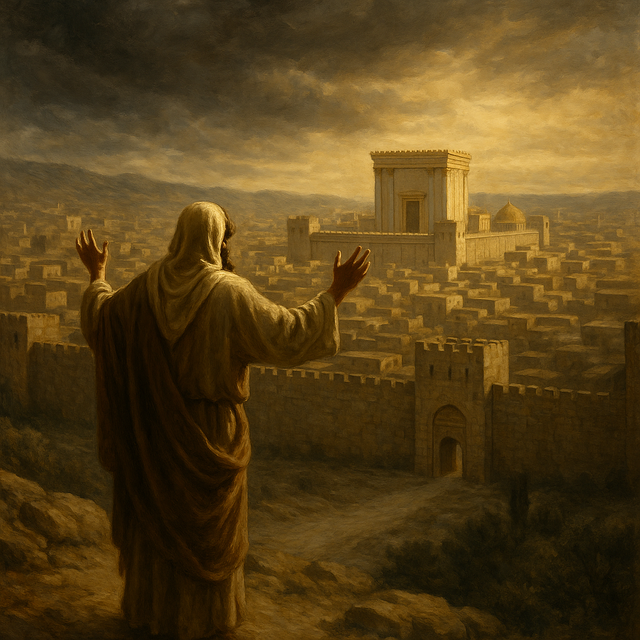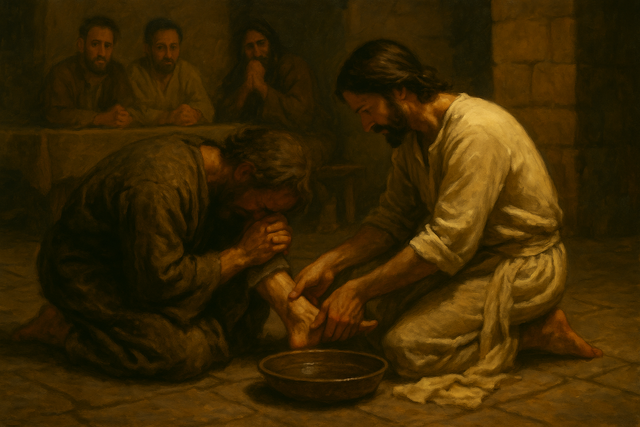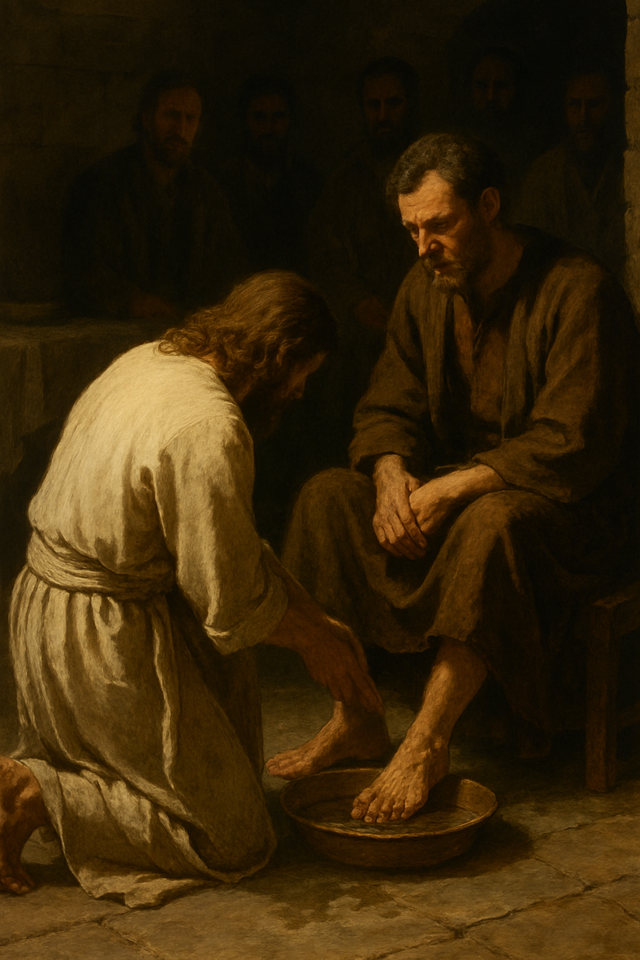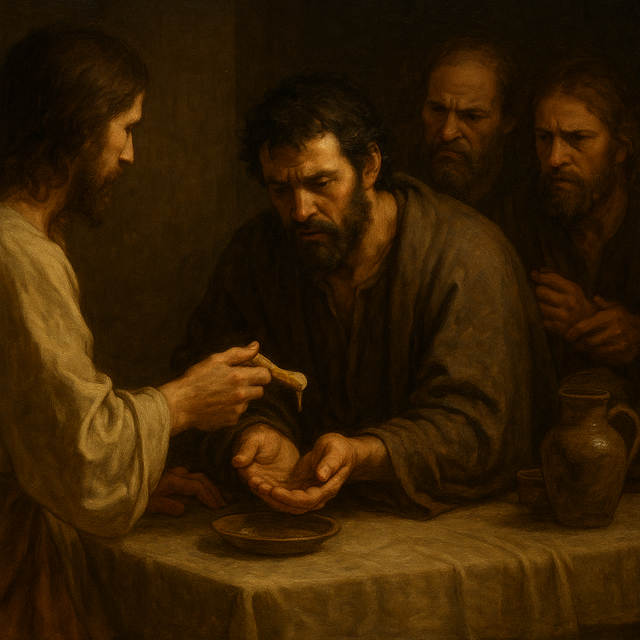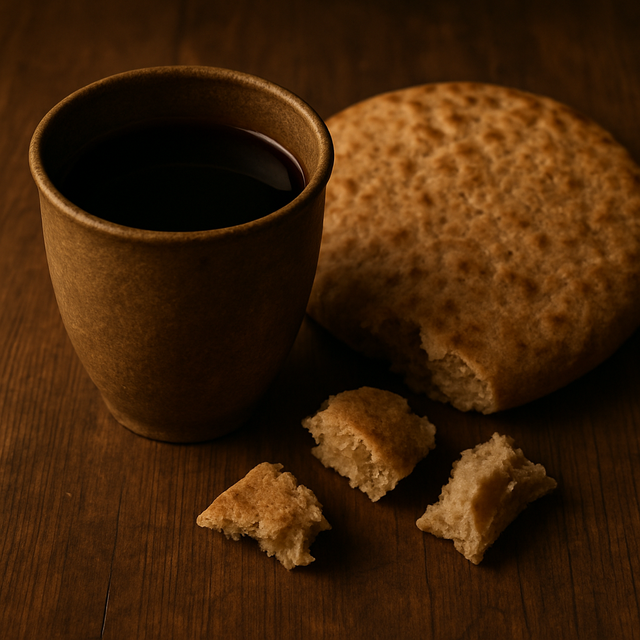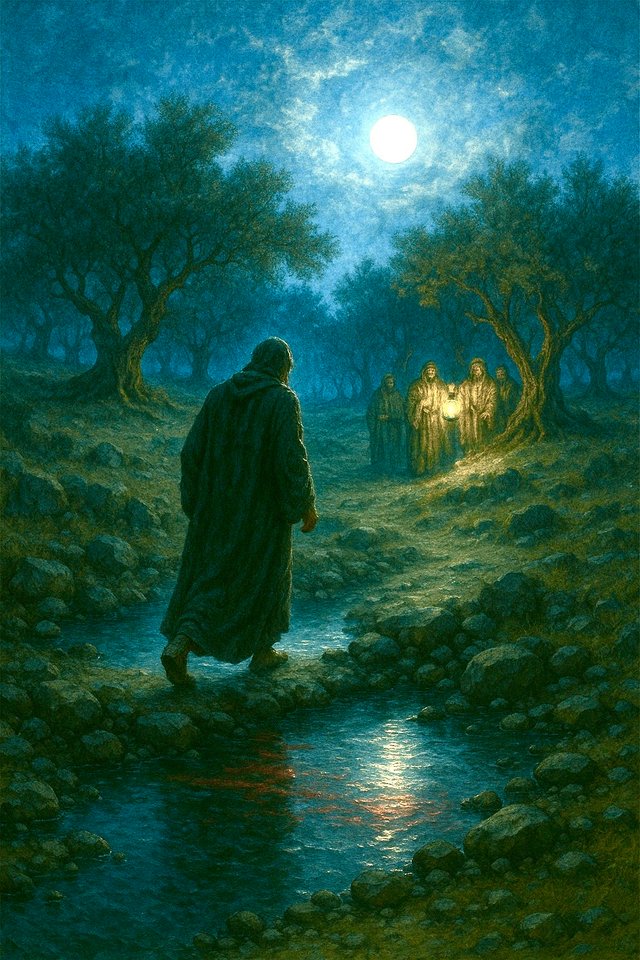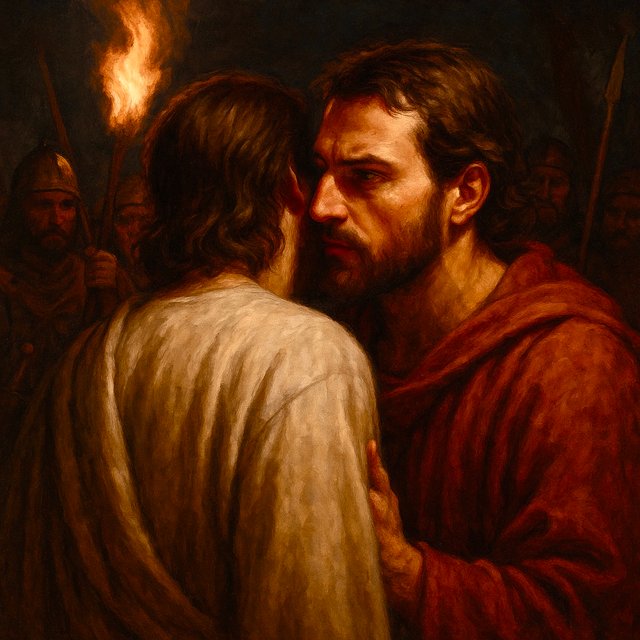Part 2. A Corrected Chronological walk with Christ
DAY FOUR — TUESDAY (The Fig Tree Cursed and the Temple Cleansed)
Mark 11:12–19; Matthew 21:12–17; Luke 19:45–48; John 2:13–17 (early cleansing referenced)
⸻
Early Morning — Leaving Bethany Toward Jerusalem
Mark 11:12
“And on the morrow, when they were come from Bethany, he was hungry.”
It is now Tuesday morning.
Jesus and His disciples leave Bethany early, making their daily climb over the Mount of Olives toward Jerusalem.
The sun is still low.
The city is coming to life ahead of them — priests preparing sacrifices, merchants setting up booths, travelers crowding in for the Passover.
⸻
The Fig Tree — Green Leaves, No Fruit
Mark 11:13–14
“And seeing a fig tree afar off having leaves, he came, if haply he might find any thing thereon:
and when he came to it, he found nothing but leaves; for the time of figs was not yet.
And Jesus answered and said unto it, No man eat fruit of thee hereafter for ever.
And his disciples heard it.”
The fig tree is beautiful from a distance — full of leaves, promising fruit.
But up close, it is barren.
Jesus curses it.
This is no random act of frustration.
It is a living parable — a warning:
• Outward show without inward fruit is hypocrisy.
• Religious appearances without true righteousness will be judged.
Israel — like this tree — has leaves but no fruit.
The disciples hear His words but do not yet understand the full weight of them.
They will tomorrow.
⸻
Entering Jerusalem — A House Defiled
Matthew 21:12–13
“And Jesus went into the temple of God, and cast out all them that sold and bought in the temple,
and overthrew the tables of the moneychangers, and the seats of them that sold doves,
And said unto them, It is written, My house shall be called the house of prayer; but ye have made it a den of thieves.”
He enters the Temple complex.
The courts are full — not of prayer, but of commerce.
• Moneychangers charge outrageous fees to convert Roman coins to Temple shekels.
• Merchants sell doves and lambs at inflated prices to the poor.
• Priests look on, profiting silently.
The Temple — meant to be a house of prayer for all nations — has become a marketplace of greed.
Jesus acts with measured authority:
• He overthrows the tables.
• He drives out the merchants.
• He reclaims His Father’s house.
This is not rage.
This is righteous judgment.
He fulfills the prophecy:
Psalm 69:9
“For the zeal of thine house hath eaten me up…”
⸻
Healing and Teaching in the Temple
Matthew 21:14
“And the blind and the lame came to him in the temple; and he healed them.”
After cleansing the Temple, Jesus remains — not to destroy, but to heal.
• The blind come — and see.
• The lame come — and walk.
• The desperate come — and are made whole.
He restores what the Temple was meant for: meeting God, receiving mercy.
⸻
Children Cry Hosanna — And the Leaders Boil with Rage
Matthew 21:15–16
“And when the chief priests and scribes saw the wonderful things that he did, and the children crying in the temple, and saying, Hosanna to the Son of David; they were sore displeased,
And said unto him, Hearest thou what these say? And Jesus saith unto them, Yea; have ye never read, Out of the mouth of babes and sucklings thou hast perfected praise?”
The authorities demand silence.
Jesus refuses.
He quotes Psalm 8:2 — showing that even the smallest voices proclaim His glory.
The leaders plot harder.
The children sing louder.
The true Temple is being filled — not with animals and gold, but with praise and healing.
⸻
Evening — Returning to Bethany Again
Mark 11:19
“And when even was come, he went out of the city.”
As evening approaches, Jesus and His disciples quietly leave Jerusalem and return to Bethany — likely to the home of Mary, Martha, and Lazarus once again.
Tomorrow will bring even sharper confrontation.
But for tonight — the city sleeps under the heavy gaze of its unseen King.
⸻
Look Around Yourself…
Would you have rejoiced at the cleansing — or recoiled at the disruption?
Would you have praised with the children — or plotted with the priests?
Would you have seen a carpenter from Nazareth — or the rightful Lord of the Temple?
His house must be a house of prayer — not a den of thieves.
And the fig tree, full of leaves but without fruit, stands as a silent warning:
Outward religion without inward righteousness is death.
DAY FIVE — WEDNESDAY (Teaching, Parables, and Open Rebuke)
Mark 11:20–12:44; Matthew 21:18–23:39; Luke 20:1–21:4
⸻
Early Morning — The Fig Tree Withered
Mark 11:20–21
“And in the morning, as they passed by, they saw the fig tree dried up from the roots.
And Peter calling to remembrance saith unto him, Master, behold, the fig tree which thou cursedst is withered away.”
As they return to Jerusalem early in the morning, they pass the same fig tree from yesterday — now withered completely.
The judgment Christ pronounced has already begun visibly.
The symbol is clear:
• Leaves without fruit equals hypocrisy without righteousness.
• Judgment will soon fall on the outwardly religious, inwardly dead leaders of Israel.
Jesus teaches the disciples a lesson on faith in God and forgiveness — but the fig tree remains a stark warning as they walk toward the Temple.
⸻
In the Temple — Confrontation Over Authority
Mark 11:27–28
“And they come again to Jerusalem: and as he was walking in the temple, there come to him the chief priests, and the scribes, and the elders,
And say unto him, By what authority doest thou these things? and who gave thee this authority to do these things?”
They challenge Him openly.
• Who gave You permission?
• Who sent You?
• Who do You think You are?
Jesus responds — as the Master Teacher — with a counter-question:
Mark 11:30
“The baptism of John, was it from heaven, or of men?”
They are trapped:
• If they say “from heaven,” they condemn themselves for rejecting John.
• If they say “of men,” they fear the people.
So they say, “We cannot tell.”
And Jesus replies:
Mark 11:33
“Neither do I tell you by what authority I do these things.”
The King does not submit to earthly tribunals.
His authority is from the Father.
⸻
Three Parables of Warning
Jesus immediately launches into parables — open challenges to the leaders’ hypocrisy and rebellion.
- The Two Sons
Matthew 21:28–32
• One son says he will not work but repents and goes.
• One says he will go but never does.
Tax collectors and harlots, Jesus says, go into the kingdom before the outwardly religious — because they repented.
⸻
- The Wicked Husbandmen
Matthew 21:33–46
• Tenants kill the master’s servants — and then kill his son.
Matthew 21:42
“The stone which the builders rejected, the same is become the head of the corner…”
The judgment is unmistakable:
• The kingdom will be taken from them.
• Given to others bringing forth fruits of repentance.
They perceive He spoke of them — and their rage deepens.
⸻
- The Wedding Feast
Matthew 22:1–14
• Those invited to the feast refuse.
• Others are brought in from the highways and hedges.
• But one without a wedding garment is cast out.
Many are called — few are chosen.
Again, Jesus exposes:
• The rejection of His offer.
• The need for righteousness — not just presence — at the feast.
⸻
Three Traps — Three Victories
The leaders attempt to trap Jesus publicly.
They send their sharpest men with their trickiest questions:
⸻
- The Tribute to Caesar
Matthew 22:15–22
“Is it lawful to give tribute unto Caesar, or not?”
If He says yes, He offends the people.
If He says no, He offends Rome.
Jesus asks for a coin:
Matthew 22:21
“Render therefore unto Caesar the things which are Caesar’s; and unto God the things that are God’s.”
They marvel — and are silenced.
⸻
- The Sadducees and the Resurrection
Matthew 22:23–33
They invent a story about a woman married seven times.
Jesus exposes their ignorance:
Matthew 22:29
“Ye do err, not knowing the scriptures, nor the power of God.”
God is not the God of the dead, but of the living.
Again, they are silenced.
⸻
- The Greatest Commandment
Matthew 22:34–40
A lawyer asks: “Which is the greatest commandment?”
Jesus answers:
Matthew 22:37–39
“Thou shalt love the Lord thy God with all thy heart, and with all thy soul, and with all thy mind… and thou shalt love thy neighbour as thyself.”
On these two commandments hang all the law and the prophets.
⸻
Jesus Asks a Question — and They Cannot Answer
Matthew 22:42
“What think ye of Christ? whose son is he?”
They answer, “The son of David.”
But Jesus asks:
Matthew 22:45
“If David then call him Lord, how is he his son?”
They are left speechless.
The wisdom of the Son of God cuts through all their craft.
⸻
The Woes — Judgment Declared on the Religious Leaders
Matthew 23:13
“But woe unto you, scribes and Pharisees, hypocrites!”
One by one, Jesus pronounces woes:
• They devour widows’ houses.
• They shut up the kingdom of heaven.
• They tithe mint and anise but neglect judgment, mercy, and faith.
They are like whited sepulchres — beautiful outside, full of death inside.
He ends with a mournful cry over Jerusalem:
Matthew 23:37
“O Jerusalem, Jerusalem… how often would I have gathered thy children together, even as a hen gathereth her chickens under her wings, and ye would not!”
Their house — the Temple — is left desolate.
Evening — Leaving the Temple for the Last Time
As the sun lowers, Jesus leaves the Temple — never again to return in public teaching.
His final words there were words of warning and sorrow.
Tomorrow — Thursday — the preparation for Passover begins.
Tonight, as He and the disciples cross the Mount of Olives again, He will speak of things yet to come — wars, rumors of wars, His own return.
But for today, His public ministry has closed.
The Lamb is about to be offered.
⸻
Look Around Yourself…
Would you have recognized the fig tree’s lesson?
Would you have rejoiced at truth — or plotted its silencing?
Would you have loved the praise of men more than the praise of God?
The King has spoken.
The Judge has warned.
The invitation has been given.
The time for decisions is now.
DAY SIX — THURSDAY (The Last Supper, the Betrayal, and Gethsemane)
Matthew 26:17–75; Mark 14:12–72; Luke 22:7–62; John 13–18
⸻
Morning — Preparation for the Passover
Matthew 26:17
“Now the first day of the feast of unleavened bread the disciples came to Jesus, saying unto him, Where wilt thou that we prepare for thee to eat the passover?”
It is Thursday morning.
The Passover approaches.
The city hums with preparations — lambs being selected, bread being broken, herbs being gathered.
But Jesus is preparing for something deeper — the offering of Himself.
He sends Peter and John:
Luke 22:10–12
“Behold, when ye are entered into the city, there shall a man meet you, bearing a pitcher of water…”
They follow the sign.
The Upper Room is secured.
The stage is set.
⸻
Evening — The Last Supper Begins
Luke 22:14–16
“And when the hour was come, he sat down, and the twelve apostles with him.
And he said unto them, With desire I have desired to eat this passover with you before I suffer.”
He sits among them — not as a distant king, but as a friend.
He speaks not with thunder, but with yearning.
He knows the cross is near — and He desires this moment with His own.
They recline around the table.
The lamb, the bread, the wine — all shadows of what He will soon fulfill.
⸻
The Foot Washing — Mercy Stoops to Serve
John 13:4–5
“He riseth from supper, and laid aside his garments; and took a towel, and girded himself.
After that he poureth water into a bason, and began to wash the disciples’ feet…”
John 13:6–9:
“Then cometh he to Simon Peter: and Peter saith unto him, Lord, dost thou wash my feet?
Jesus answered and said unto him, What I do thou knowest not now; but thou shalt know hereafter.
Peter saith unto him, Thou shalt never wash my feet.
Jesus answered him, If I wash thee not, thou hast no part with me.
Simon Peter saith unto him, Lord, not my feet only, but also my hands and my head.”
• Peter initially refuses out of pride and love,
but when Jesus warns him, Peter completely submits, overwhelmed, broken, thankful, desperate for full cleansing.
The King kneels.
The Master serves.
One by one — dusty, tired, sinful feet are washed by hands that shaped galaxies.
Even Judas’s feet are washed — though they will soon rush to betrayal.
Peter protests — then yields.
The lesson is clear:
• True greatness stoops to serve.
• True cleansing comes from Christ alone.
⸻
The Betrayer Is Exposed — Yet Not Hindered
John 13:21–27
“When Jesus had thus said, he was troubled in spirit, and testified, and said, Verily, verily, I say unto you, that one of you shall betray me.
… He it is, to whom I shall give a sop, when I have dipped it.
And when he had dipped the sop, he gave it to Judas Iscariot…
And after the sop Satan entered into him.”
Judas —feet still wet from the foot washing — now receives the bread of fellowship from Christ’s own hand.
But there is no repentance.
Only cold determination.
The Scripture does not say that Judas was sorry — only that Satan entered him.
He rises.
He leaves into the night.
And the Gospel records it simply:
John 13:30
“And it was night.”
Not only outside — but within Judas’s soul.
⸻
The New Commandment — Love One Another
John 13:34–35
“A new commandment I give unto you, That ye love one another; as I have loved you…”
With Judas gone, Jesus speaks freely.
Love — not betrayal.
Service — not selfish ambition.
Surrender — not rebellion.
⸻
The Institution of the Lord’s Supper — The Cup of the Covenant
Matthew 26:26–29
“And as they were eating, Jesus took bread, and blessed it, and brake it, and gave it to the disciples, and said,
Take, eat; this is my body.
And he took the cup, and gave thanks, and gave it to them, saying,
Drink ye all of it;
For this is my blood of the new testament, which is shed for many for the remission of sins.
But I say unto you, I will not drink henceforth of this fruit of the vine, until that day when I drink it new with you in my Father’s kingdom.”
He takes the bread —
blesses it —
breaks it —
and gives it to them.
The bread represents His body, soon to be broken for them.
Then He takes the cup —
and speaks not of “wine,” but of “the fruit of the vine.”
This is deliberate.
• Not the fermented corruption of strong drink,
• But the pure blood of the grape — the life given freely, unstained, uncontaminated.
• As the law said, “the pure blood of the grape” (Deuteronomy 32:14).
Here is no drunken celebration.
Here is no careless ritual.
This is the new covenant in His blood —
pure, spotless, poured out willingly for the remission of sins.
The cup — not merely its contents — also bears the meaning.
• It is the cup of suffering.
• It is the cup of judgment He must drink down fully.
• It is the cup of blessing poured out for His sheep.
Thus, the bread and the cup are given —
as memorials, not for indulgence, but for remembrance, repentance, and hope.
The Lamb prepares to be broken.
The Vine prepares to be pressed.
And He promises —
He will drink it again, new,
in His Father’s kingdom,
when the marriage supper is ready,
and death is swallowed up in victory.
⸻
The Hymn, the Walk, and the Crossing of Cedron
Matthew 26:30
“And when they had sung an hymn, they went out into the mount of Olives.”
They sing —
the voices of weary men rising in the night air —
Psalms of deliverance and mercy.
Then they leave the city walls —
and walk down into the valley that lies between Jerusalem and the Mount of Olives.
At the base of the valley runs a stream —
the brook Cedron — dark, cold, fed by the runoff from the Temple.
It is Passover.
Thousands of lambs have been slain.
The blood of sacrifice —
the blood of countless lambs —
mingles with the waters of Cedron and flows like a crimson shadow through the valley.
John 18:1
“When Jesus had spoken these words, he went forth with his disciples over the brook Cedron, where was a garden…”
He steps across the brook.
• Over the blood of lambs.
• Over the death of the old covenant.
• Toward the Garden of Crushing — toward Gethsemane.
The True Lamb walks through the blood of shadows —
to offer the real sacrifice.
Gethsemane — The Agony of the Cup
Matthew 26:36–38
“Then cometh Jesus with them unto a place called Gethsemane…
and saith unto them, My soul is exceeding sorrowful, even unto death…”
He leaves most of the disciples at the entrance.
He takes Peter, James, and John further in.
He goes a little farther still — and falls on His face.
Matthew 26:39
“O my Father, if it be possible, let this cup pass from me: nevertheless not as I will, but as thou wilt.”
The Cup — the full wrath of God against sin — is before Him.
He does not shrink from death.
He shrinks from becoming sin itself — something so foreign to His perfect nature.
Yet He yields.
⸻
The Disciples Sleep — The Savior Prays Alone
Matthew 26:40
“And he cometh unto the disciples, and findeth them asleep…”
Three times He returns.
Three times He finds them sleeping.
The spirit is willing — the flesh is weak.
Christ prays — sweating as it were great drops of blood — utterly alone under the crushing weight of the world’s redemption.
⸻
The Betrayer Arrives — And the Kiss of Death
Matthew 26:47–50
“And while he yet spake, lo, Judas, one of the twelve, came…
and forthwith he came to Jesus, and said, Hail, master; and kissed him.”
The kiss — meant for fellowship — becomes the seal of betrayal.
Judas does not come weeping.
Judas does not come torn by inner conflict.
He comes resolved, possessed by Satan, leading soldiers with swords and staves.
The darkness moves.
The hour is at hand.
Look Around Yourself…
Would you have eaten the bread — then fled?
Would you have prayed — or slept?
Would you have kissed — or wept?
Here the lines are drawn:
• The Son of Man stands alone.
• The friends are scattered.
• The betrayer smiles — but is already condemned.
Christ walks forward — not trapped, not defeated — but triumphant in surrender.
